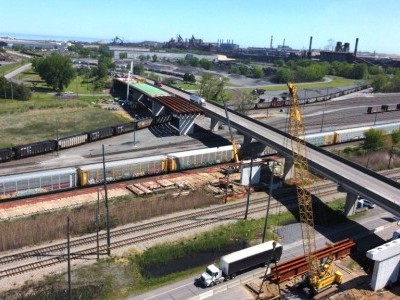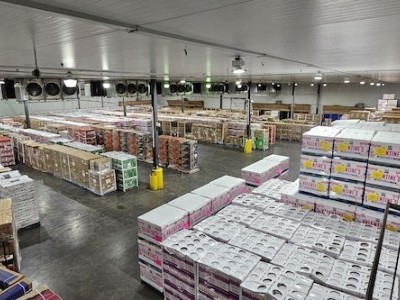Battered and Bruised, Supply Chains Shift to Recover-and-Survive Mode
When the timeline of the pandemic of 2020 is complete, March 24 will stand out as a day to remember for everyone from sports fans to anthropologists to cola drinkers.
Japan postponed the Summer Olympics that day. India put 1.3 billion people under lockdown. Inhabitants of the U.K. awoke to their first day in home confinement from the coronavirus. The World Health Organization warned the U.S. could become the new hub of the outbreak. President Donald Trump said he’d love to see the country reopen by Easter, just three weeks later.
In the midst of that remarkable Tuesday, the CEO of Coca-Cola Co. described what he saw from the helm of the iconic American beverage company. “The supply chain is creaking around the world,” James Quincey said in an interview on CNBC.
Fast forward a month and some strains remain and some are worsening, particularly in the pipelines for fresh food and medical goods. But just a few days ago Quincey sounded relieved that plant shutdowns were confined to “just a couple of places” and he even congratulated employees for “basically keeping everything running.”
A “great strength” during the disruptions, he said on April 21, has been local production of Coke’s soft drinks and juices.
“The drinks in the U.S. are made in U.S. The drinks in Germany are made in Germany. The drinks in Kenya are made in Kenya,” Quincey said. “The local supply chain is then able to work designated as part of the food system, so an essential service, to allow to run the production systems and distribution. So we’ve had some issues on timing of ingredients. Those are much better than they were a few weeks ago.”
The same can’t be said of American meatpacking companies that have closed processing plants to contain outbreaks among their workers. Or auto companies with supplier networks sprawling from southeast Asia to eastern Europe that are at least another week away from restarting assembly lines. Or industrial giants like Alcoa Corp. that have to reckon with weak global demand for several more months or perhaps longer.
As publicly traded companies describe how they weathered a quarter most people would like to forget, here are some other examples of how big supply chains are holding up:
‘Heroic Work’
Unilever, with more than 200 factories around the world, has been running at about about 85% capacity, reflecting some “absolutely heroic work by some people on the front lines of our supply chain, adjusting to new patterns of demand and securing new supply routes for ingredients,” Chief Executive Officer Alan Jope said in an interview Thursday with Bloomberg Television.
Like many companies, the Anglo-Dutch maker of Lipton tea, Breyers ice cream and Dove soap has been trying to ensure it has enough workers who face both government restrictions on travel and time off needed when the virus strikes them. When Northern Italy shut down, the company got approval within hours to keep producing a line of food products in the region. In India, a similar request took four to five days. When an outbreak hit a facility in the Middle East, where many workers live in dorms, Unilever booked hotel rooms so those who tested positive could stay isolated and the others could go to work, according to Jope.
“Most of our supply chain is local, it’s very flexible, and generally speaking the vast majority of the products we sell in a country we supply in that country,” Unilever Chief Financial Officer Graeme Pitkethly said on a conference call with reporters on Thursday.
Pernod Ricard, the Paris-based maker of spirits including Malibu Coconut Rum and Jameson Irish Whiskey, is working through the disruptions with an exception being India, where there remains a strict lockdown. There have been small constraints on key supplies like glass, corks and labels “but broadly, for the time being, it’s working,” Chief Executive Officer Alexandre Ricard said in an interview.
“But it’s working because you have a lot of people on the ground working like crazy to make that happen,” Ricard said. “The key there is to have very strict sanitary guidelines so that our colleagues feel safe.”
Staying Flexible
Walmart Inc., facing a sudden demand spike in China as people started eating more at home, teamed up with other food, entertainment and hospitality companies to share employees in a bid to avoid worker shortages. The company has also hired more than 15,000 part-time workers in the country.
The employee-sharing arrangement involves about 160 companies and means that more than 400 Walmart stores in China used employees from other companies. The retailer not only mitigated the shortage of manpower amid a sudden surge of livelihood necessity needs, but also eased the income pressure for those workers in epidemic-affected industries, a Walmart China representative said.
Chinese grocery upstarts including Yonghui Superstores Co. and Alibaba’s Hema supermarket chain have also started similar worker-sharing pacts. Hema told local media that such workforce arrangements might become normal practice and continue after the pandemic.
For Danone, the French food processing company, flexibility became one of its biggest challenges in adjusting to “significant changes in consumers’ buying behaviors, with unprecedented swings in weekly demand accentuated by stocking patterns in the first weeks, the shift from out-of-home to at-home food consumption, as well as shifting preferences to larger pack sizes..”
Volkswagon AG posted a Q&A with its purchasing and logistics executives on its website on April 20, crediting a supply chain that stayed intact to “an incredible amount of solidarity and flexibility on all sides.”
“The next step is now to secure the start-up in Europe and at the same time to guarantee production in China,” said Karsten Schnake, the head of purchasing at VW Group China. “We source a little over 2,000 parts from Europe and the rest of the world. For most parts, we are covered for a few more weeks.”
We Have the Technology
The tech industry continues to wrestle with uncertainty around the pandemic. This month, Broadcom Inc. warned customers they’ll need to place orders for parts at least six months ahead of time, a surprisingly long lead time that points to wider than anticipated disruptions to the global supply chain.
Taiwan Semiconductor Manufacturing Co. and SK Hynix Inc. — two corporations with a birds-eye view of the global production chain thanks to their upstream roles — tamped down fears that Covid-19 was smothering supply lines but warned that could change swiftly if the pandemic persists.
TSMC, supplier of advanced silicon to most every major name from Apple Inc. to Huawei Technologies Co. and Qualcomm Inc., acknowledged the potential for supply-chain disruption in its annual report released April 21. CFO Wendell Huang however stressed that deft adjustments could mitigate the fallout. Signaling confidence in a gradual recovery, TSMC is setting aside $16 billion for technology upgrades and capacity this year.
“We did not see any disruption from the material supply or any supply-chain activity that has been in disruption mode. Although I did say that because of shelter-in-home that some of the tool delivery has been delayed from two weeks to about one month,” investor relations chief Jeff Su told reporters on a post-earnings conference call. “We continue to work with tool vendors and minimize the impact on the capacity building. So for the whole year, we don’t expect it to have a big impact.”
For companies in the U.S. and Europe, ultimately what may happen is a broad reassessment about whether key supplies ought to be manufactured closer to home.
“For the first time we’re seeing not just one or two countries closing down, we have three countries closing down,” said David Farr, CEO of Emerson Electric Co., which supplies automation equipment to the oil and gas industries and produces consumer goods, such as garbage disposals and shop vacuums. “So what we’re going to have to do here is evaluate this from an economic standpoint and enterprise-risk standpoint.”
Similar Stories

Jeffersonville port delivers record road salt shipments to Greater Louisville area during recent winter storms
View Article
C.H. Robinson now accepting applications for annual carrier scholarship program
View ArticleNC Ports Notice: Holiday Schedule Notice Martin Luther King Jr. Day
The Port of Wilmington Container Gate (South Gate) and the Charlotte Inland Port (CIP) will operate on a reduced schedule on Monday, January 20: 8 AM-12 PM and 1 PM-5…
View Article
Beyond Disruption: Proactive steps to strengthen supply chain resilience
View Article
Port of Long Beach’s Cordero hails ‘Green Port’ achievements
View ArticleShipBob’s 2025 State of Ecommerce Fulfillment Report provides insights into Merchants’ Global, Omnichannel Supply Chains
ShipBob, a leading global supply chain and fulfillment platform for SMB and Mid-Market e-commerce merchants, today released its fourth annual State of Ecommerce Fulfillment report. The report is based on…
View ArticleGet the most up-to-date trending news!
SubscribeIndustry updates and weekly newsletter direct to your inbox!





